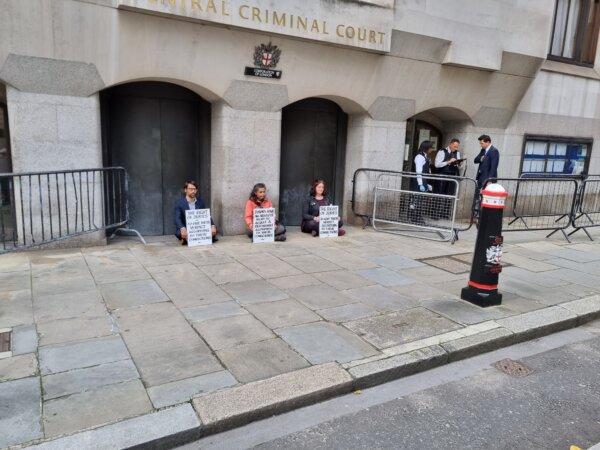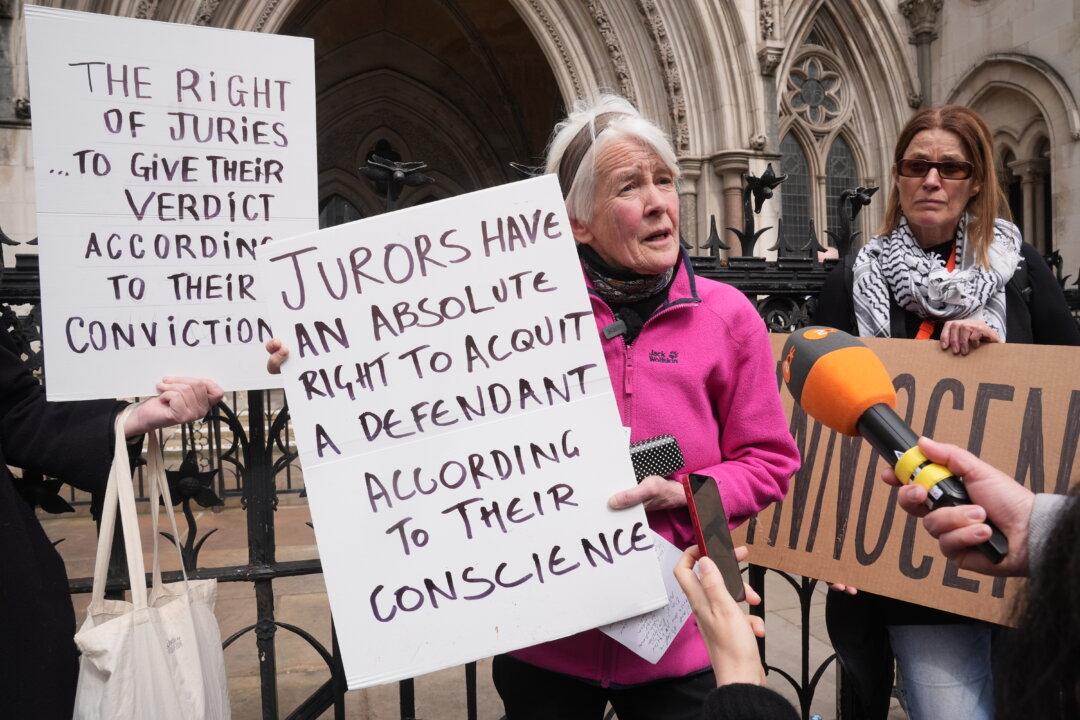A High Court judge has refused permission for a protester, who was accused of “deliberately targeting” jurors by holding up a sign outside a court where climate activists were due to go on trial, to be prosecuted for contempt of court.
Trudi Warner, a retired social worker, was arrested on March 27, 2023 outside Inner London Crown Court before a trial involving members of the activist group Insulate Britain.
Her sign read, “Jurors you have an absolute right to acquit a defendant according to your conscience.”
Similar placards have been held outside the Central Criminal Court—better known as the Old Bailey—and several other courts in the past 12 months.
One of the most famous convictions for breaking the law was Tommy Robinson, who was jailed after being found in contempt of court after he filmed men accused of the sexual exploitation of young girls and live-streamed the footage on Facebook, in breach of a reporting ban, outside Leeds Crown Court in May 2018.
Last week, lawyers for the Solicitor General, Robert Courts, asked the High Court in London for permission to prosecute Ms. Warner for contempt of court, claiming her conduct was a “serious interference” with the “administration of justice.”
But barristers representing Ms. Warner argued her actions did not constitute a criminal offence it was not in the public interest to prosecute her.
On Monday, Mr. Justice Saini delivered his judgment at the Royal Courts of Justice and said he would not be granting Mr. Courts the right to prosecute Ms. Warner.
Judge Saini said, Ms. Warner had, “accurately informed potential prospective jurors about one of their legal powers.”
The judge said there was a “tension which the law tolerates” between the capacity of a jury to return a verdict according to conscience, and their obligation to follow judicial directions and return a verdict depending only on the evidence.
Judge Saini said, “Overall, in my judgment, the claim is based on a mischaracterisation of what Ms. Warner did that morning and a failure to recognise that what her placard said outside the court reflects essentially what is regularly read on the Old Bailey plaque by jurors, and what our highest courts recognise as part of our constitutional landscape.”

‘I Simply Want Jurors to Know Their Rights’
She said, “I simply want jurors to know their rights.”Holding up the sign outside the High Court on Monday and referring to the words, she said, “We have heard today that this is right, this is correct. We need everybody in the country to know about it. The power rests with us.”
In his ruling the judge said, “The text of the placard … did not implore jurors to act or give an instruction, it simply communicated directly with jurors to summarise the principle of jury equity.”
The government has become increasingly concerned at the number of climate change activists and other protesters who have been acquitted despite overwhelming they have committed crimes such as criminal damage or obstruction.
The court ruled climate change activists and other protesters could not use their “political or philosophical beliefs” as a defence if charged with criminal damage.
Three judges ruled a climate change activist’s defence—which led to their acquittal—that a property owner would have consented to damage if they had been aware of the full impact of climate change, was “too remote” to be classed as a “lawful excuse.”
The individual, who can only be identified as XX for legal reasons, successfully used the defence, but Ms. Prentis asked the Court of Appeal to review the way the law had been used during the trial.







